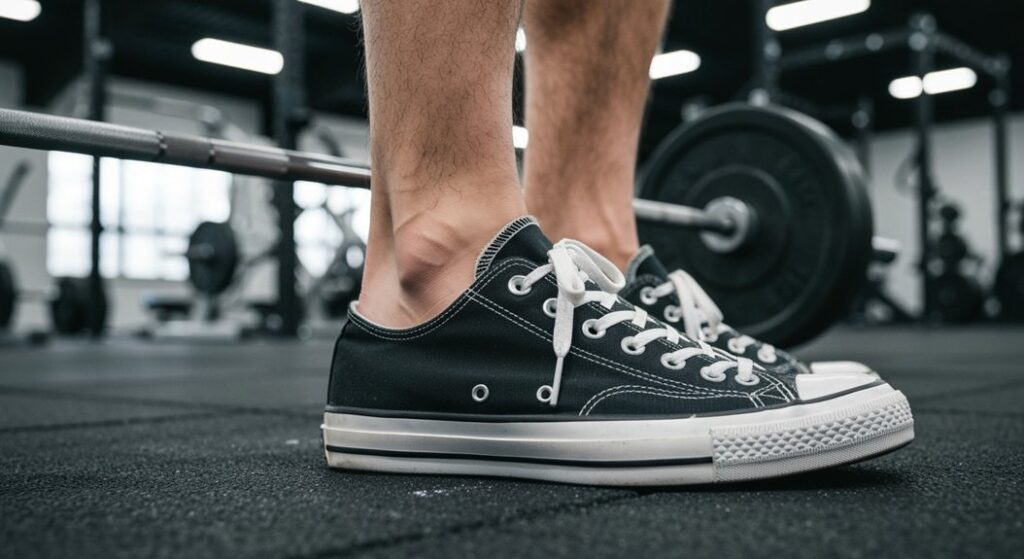
Top 5 gym shoes for HIIT workouts
Not sure which gym shoes can handle your most intense HIIT sessions? Discover the top 5 picks that could transform your performance.
If you’re wondering how to use Converse shoes for weightlifting, you’re not alone—many lifters choose Converse shoes for weightlifting because of their reliable performance in the gym.

However, keep in mind that while Converse shoes for weightlifting are a great budget-friendly option, they may lack some features found in specialized lifting shoes, such as additional ankle support or a raised heel. Still, for many, Converse shoes for weightlifting are a simple, stylish, and functional choice that can elevate your performance in the gym.
If you’re looking for the best shoes for lifting, Converse shoes are an excellent choice.
Converse shoes are popular among weightlifters because of their flat, non-compressible soles, allowing you to maintain solid and stable footing during every lift. The minimal heel-to-toe drop in Converse shoes supports proper form and ensures you stay grounded, so you can focus on your strength training.
Plus, the canvas upper of Converse shoes fits your feet snugly, while the durable rubber outsole delivers reliable grip on gym floors.
Unlike cushioned athletic sneakers, Converse shoes won’t interfere with your stance, helping you lift with confidence and control.
One of the key benefits of flat soles during weight training is the stable foundation they offer for every lift.
Choosing flat soles during weight training means you won’t have to worry about extra cushioning affecting your balance or technique.
Flat soles help you push firmly into the ground, which improves force transfer and gives you greater control over your movements.
With flat soles during weight training, you’ll feel more connected to the ground, boosting your confidence and reducing the risk of slipping or losing your balance.
If you want to maximize your power and performance in the gym, flat soles during weight training are a smart choice.
To get the best stability from your Converse shoes during weightlifting, it’s important to use proper lacing techniques.
Start by tightening the laces evenly from the toe box all the way up to the top eyelets. This will help your Converse shoes fit securely and prevent unnecessary movement.
Make sure the ankle area is snug but not too tight, so you maintain comfort and support.
Double-knot your laces so your Converse shoes stay secure during every set.
Using the right lacing technique with your Converse shoes can reduce the risk of slipping and help you maintain balance and safety during weightlifting.
Curious about how Converse compare to traditional lifting shoes? When it comes to lifting, Converse are a popular choice because their flat, non-compressible sole provides a stable base and helps with balance during heavy lifts.
Many people find that Converse support a strong connection with the ground, which is essential for effective force transfer.
However, traditional lifting shoes offer unique advantages—they feature an elevated heel and extra foot support, which can enhance posture and stability, especially for squats and Olympic lifts.
If you’re deciding between Converse or traditional lifting shoes, consider your comfort, budget, and specific lifting goals.
Whether you choose Converse or opt for traditional lifting shoes, focus on what keeps you motivated and confident in the gym.
Looking to get the most out of your workout? Many lifters find that certain exercises are best suited for Converse footwear. Thanks to their flat and sturdy soles, Converse shoes provide the perfect foundation for movements like squats, deadlifts, and overhead presses.
Wearing Converse footwear during these exercises allows you to push power directly into the ground, helping you lift with greater stability and confidence.
Other great exercises to try in Converse footwear include barbell rows, bench presses, and Romanian deadlifts. The solid grip and minimal cushioning of Converse footwear help you maintain proper form and secure footing throughout your routine.
Whether you’re a beginner or an experienced lifter, choosing Converse footwear can make a noticeable difference in your performance and results.
Try adding Converse footwear to your gym lineup and experience the benefits for yourself!
When considering Converse shoes for weightlifting, it’s important to understand their potential drawbacks.
While Converse shoes are a popular choice for many lifters, they may not provide the arch support needed for longer workouts. The classic canvas material of Converse shoes can also lack the stability required for heavy, dynamic lifts.
Some athletes notice less traction on certain gym floors, which can impact performance. Additionally, Converse shoes offer minimal toe protection and aren’t designed for running or high-impact activities.
Want to make your Converse last longer at the gym? Protecting your Converse in the gym is easier than you think with a few simple habits.
First, always wipe down your Converse after every workout to remove sweat and dirt—this keeps your Converse looking fresh and prevents early wear.
Next, try rotating your Converse with another pair of shoes to reduce daily stress.
Don’t let your Converse get too wet, and always store them in a cool, dry place to prevent damage.
For extra care, use a gentle cleaner on your Converse fabric and rubber, so they’re always ready for your next gym session.
With these tips, your Converse will stay gym-ready and stylish for much longer!
Discover how Converse shoes for weightlifting can help you achieve your fitness goals. Thanks to their flat, stable sole, Converse shoes for weightlifting provide the solid foundation you need for squats, deadlifts, and other strength exercises. For the best results, lace up your Converse shoes for weightlifting tightly to ensure maximum support and stability.
While they may not completely replace professional lifting shoes, Converse shoes for weightlifting are a reliable and versatile choice for most gym enthusiasts. Take good care of your sneakers, and you’ll enjoy both comfort and enhanced performance every time you hit the gym.

Not sure which gym shoes can handle your most intense HIIT sessions? Discover the top 5 picks that could transform your performance.

Picking the perfect women’s gym shoes for cross-training is trickier than it seems—discover which features truly matter before making your choice.

Here are the 5 best eco friendly gym clothing materials you need to know—discover which sustainable fabrics outperform the rest in our top picks.

Prepare to upgrade your gym gear with the top 5 breathable fabrics for workout shirts—discover which materials truly outperform the rest.

Curious if your favorite sneakers can survive a spin cycle? Click to uncover the crucial steps for machine washing your gym shoes the right way.

Jump into the ultimate guide on the 5 best gym shoes for weightlifting and cardio—you won’t believe which pair tops the list.